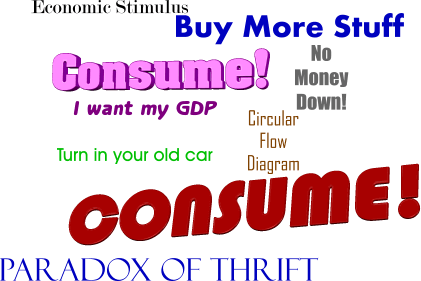Sustainable Economics -- a Conservative Approach
Growth is great when you need more stuff. But at some point it is good to ask, “Do I need to buy yet more stuff so I can create a bigger avalanche potential in my closets?” Does it make sense to extend your commute so you can afford a bigger house with bigger closets to hold more stuff that you no longer have time to use? At some point it makes sense to say “Enough” and put more emphasis on quality, free time, family and/or community.

But don’t tell the government! Our government depends on perpetual economic growth. Look at the national debt: 17 Trillion dollars and counting. And that doesn’t include the implicit debt, the government obligations to take care of veterans from the last two wars, government guarantees of a host of different loans, government obligations to provide retirement stipends and medical care for an increasingly aging population.
Politicians love economic growth. It doesn’t matter if we produce more pointless stuff, or if we work too hard, stress ourselves out or neglect our children to get it. A growing Gross Domestic Product gives a neat numerical grade to our politicians, even though the connection between GDP and human happiness is tenuous at best.
And so the government artificially goads the economy into unnatural growth. We have stimulus programs and supply side economics, subsidy programs and Job Creation. We may be too fat, but we still have government sponsored ad campaigns to get people to eat more: “Got milk?” “The incredible edible egg!” “Meat. It’s what’s for dinner.” We even have a Bill of Rights defying War on Drugs to keep people from becoming lazy hippies. And so We the People work and spend, work and spend, and wonder where our spare time went.
This is not good for the environment. It’s also bad for family and community. Conservatives take note!
Our financial system is likewise geared to grow or crash. All too many corporations are financed to either grow or go bankrupt. The markets which trade in shares of these corporations and derivatives thereof are also unstable.
Many doubt that our economy could handle Ecotopia. I tend to agree.
However, I cannot completely throw in my hat with the Peak Oil doomsayers, who salivate at the prospect of society’s demise when the oil runs out so we are forced to rediscover community. They are the green analog of libertarians who wait for Atlas to shrug or gold bugs waiting to cash in on hyperinflation. Cheerleading for doom is not mellow.
And I’m also not a hippy vegan. I like having stuff. I like cars that aren’t cramped, homes that are comfortable, and enough meat to maintain muscle mass. Unlike Jeremy Rifkin, I don’t want to downgrade the American Dream down to that of a Mayan peasant.
But the economy we have today is hugely wasteful. People drive on ridiculously long commutes, while the pundits pontificate on the need for dinky fuel efficient cars. (Which is more efficient, a Chevy Caprice for five mile commute or a Honda Prius for a thirty mile commute?) We eat factory farmed frankenfoods in order to save on labor costs while our government creates make work jobs to reduce the unemployment rate. The government stimulates the economy until it crashes like an overcoked yuppie.
I look back at reruns of The Jetsons and The Andy Griffith Show, and I dare say the latter utopia strikes me as more pleasant. Give Andy a modern clean burning car and have Gomer and Goober installing rooftop solar collectors and you are pretty close to Ecotopia. Maybe I'm getting old.
The Politically Challenging Paths to Sustainability
A sustainable economy requires challenging today's political paradigms.
The poor need more income growth than the prosperous. More equality means less need for frantic growth. Lefty goodness, but a hard sell to Republicans.
On the other hand a resource light economy is a service heavy economy. We cannot give everyone in the lower and middle classes “good” unionized factory jobs. Back in the “bad old days” the rich hired armies of servants. Today they fly in private jets. Guess which is better for the environment? Now it's time for Democrats to squirm.
The paths to a sustainable economy are sometimes politically correct, sometimes not. Republicans need to dial back their love of fossil fuels, factory farms, tax cuts for the rich funded by deficits and persecution of the lazy. Democrats need to dial back their love of unionized factories, Keynesian economics, make-work jobs, and militant feminism. And all politicians need to stop measuring progress using GDP; it is a bad measure of human happiness.
Can you handle these paradigm shifts? Should I even bother writing more? Let me know in the comments below. I have plenty of ideas on sustainable economics trapped in my brain, but I’m not going to bother writing them down unless there is some interest.



